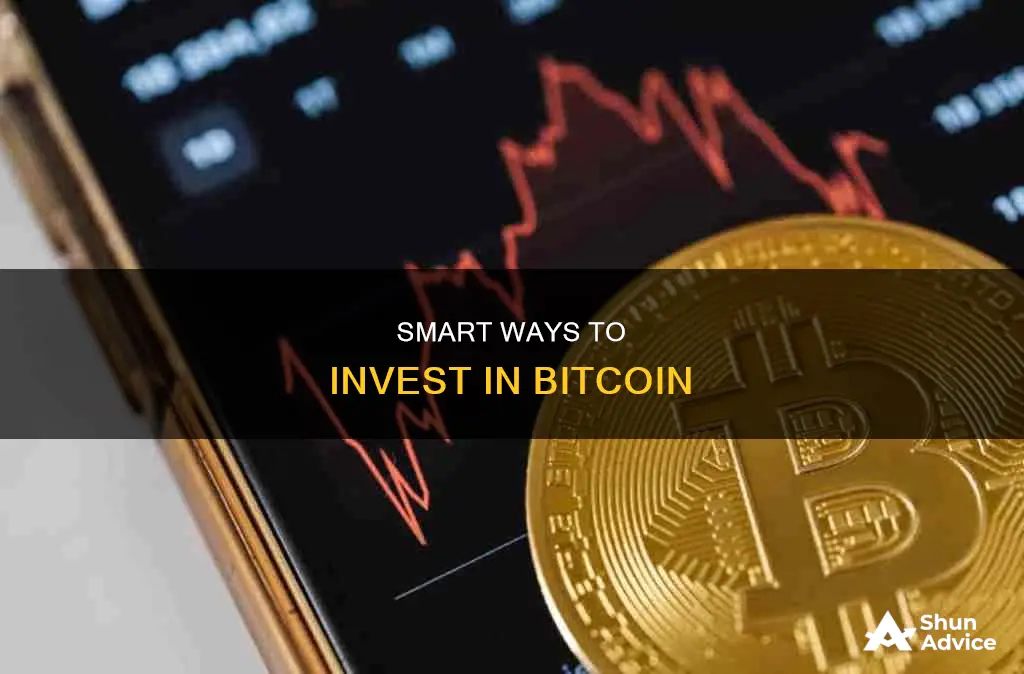
Bitcoin is a popular type of cryptocurrency that has been increasingly gaining momentum among investors. It is a highly volatile asset that is prone to large and fast swings in value, which presents an opportunity for large returns but also poses tremendous risk.
1. Join a Bitcoin Exchange: Most Bitcoin investors use cryptocurrency exchanges. There are several different exchanges that facilitate Bitcoin transactions, including Coinbase, Binance, Kraken, Gemini, and Bitfinex.
2. Get a Bitcoin Wallet: When you purchase Bitcoin, it is stored in a wallet. There are two types of wallets: a hot wallet or a cold wallet. A hot wallet is operated by either your cryptocurrency exchange or provider, while a cold wallet is an actual piece of hardware that stores your coins, usually a portable device similar to a flash drive.
3. Connect Your Wallet to a Bank Account: You will need to link your wallet to your bank account to enable you to purchase and sell coins. Alternatively, your bank account may be linked to your cryptocurrency exchange account.
4. Place Your Bitcoin Order: Decide how much Bitcoin you want to purchase. Keep in mind that investing in Bitcoin is very risky, and it's important to carefully determine your risk tolerance and review your investment strategy before buying.
5. Manage Your Bitcoin Investments: After purchasing Bitcoin, you can use your coins to make online transactions, hold them for potential long-term appreciation, or perform day trading.
| Characteristics | Values |
|---|---|
| Investment type | Commodity |
| Investment risk | High |
| Investment regulation | Largely unregulated |
| Investment returns | Volatile |
| Investment access | Crypto exchanges, brokerages, P2P exchanges, crypto ATMs, payment processors, and bitcoin rewards cards |
| Investment amount | Fractional amounts |
| Investment identification | Social security number, bank information, and government-issued picture ID |
| Investment funding | Bank account, debit card, credit card, wire transfer, or other forms of crypto |
What You'll Learn

Choosing a crypto-trading service or venue
There are several options for buying and selling bitcoin, each with its own advantages and disadvantages. Here are some things to consider when choosing a crypto-trading service or venue:
- Centralized exchanges: These platforms allow users to buy and sell cryptocurrencies with the help of a third party. Examples include Coinbase, Kraken, Gemini, and Binance. Centralized exchanges usually offer a wider range of features and cryptocurrencies for trading. They also enable investors to buy, sell, and hold cryptocurrencies and allow users to transfer crypto to their online wallets for safekeeping.
- Decentralized exchanges (DEXs) : These platforms allow crypto investors to trade directly with each other without the need for a middleman. DEXs can be a good option for those who value anonymity and decentralization. However, they may not offer the same breadth of features and cryptocurrencies as centralized exchanges.
- Hybrid exchanges: These platforms aim to combine the features of centralized and decentralized exchanges. They offer the liquidity of a centralized exchange with the security and anonymity of a DEX.
- Peer-to-peer (P2P) exchanges: These platforms are more like open markets that allow people to trade crypto directly with each other. P2P exchanges can provide a more direct connection between users and allow users to shop around for the best trading terms. However, they may not offer the same level of security and features as centralized or hybrid exchanges.
When choosing a crypto-trading service or venue, it is important to consider factors such as ease of use, security, the range of cryptocurrencies offered, transaction fees, and whether your funds will be insured. It is also crucial to understand the risks involved in trading bitcoin, as it is a volatile and largely unregulated market.
Bitcoin Investment: Is it a Smart Move?
You may want to see also

Connecting your exchange to a payment option
At most exchanges, you can connect your bank account directly, or you can link it to a debit or credit card. Although you can use a credit card to purchase cryptocurrency, the volatility of cryptocurrency prices could inflate the overall cost of purchasing a token when combined with a credit card's interest charges.
It is worth noting that some banks may question or even stop deposits to crypto-related sites or exchanges, and fees vary for deposits via a bank account, debit, or credit card. Exchanges also charge fees per transaction.
Fusion Coin: A Viable Investment Option for US Investors?
You may want to see also

Placing an order
Once you have your funding source connected to the platform where you plan to trade bitcoin, and you understand the transaction fees involved, you can place an order. This part may feel similar to the trading options you might see on a traditional exchange, or when making stock trades. Most crypto exchanges give investors the option to place market orders, limit orders, stop-loss orders, and more.
In addition, you can buy bitcoin in fractional amounts by dollar-cost-averaging, i.e., investing small amounts on a recurring schedule over time.
Before placing an order, it is important to understand your risk tolerance and review your investment strategy. Bitcoin is a very high-risk investment because it’s a volatile asset. That means that Bitcoin values may rise or fall dramatically in value over a very short period—even as quickly as a few hours or days.
Investing in Bitcoin is very risky, and it’s important that you carefully determine your risk tolerance and review your investment strategy before you purchase any Bitcoin.
How to Place an Order
To place an order, you will need to select the number of bitcoins you want to purchase. One Bitcoin costs about $40,000, making it difficult for everyone to purchase a round-number amount. You can buy the cryptocurrency in fractions, allowing you to purchase exactly the amount you want.
Once you think the moment is right, click the buy button to enter an order. The exchange will turn your dollars into Bitcoin, stored in the same cryptocurrency account, similar to holding stocks in a brokerage account. Once your trade executes, you are officially a Bitcoin owner.
Dogecoin Investment: Where to Buy the Meme Coin?
You may want to see also

Safe storage
Cold Storage:
Cold storage refers to keeping your Bitcoins offline, which provides enhanced security against theft by hackers and malware. This method involves storing your Bitcoins in an offline wallet, such as a hardware wallet or a cold storage wallet created using BitKey. Hardware wallets, like TREZOR, are physical devices designed to store your Bitcoins securely and are considered one of the safest options. They are simple to use and highly resistant to viruses, hackers, and keyloggers.
When using a cold storage wallet, an unsigned transaction is first generated on an internet-connected computer. This unsigned transaction is then transferred to the offline computer for verification and signing with the wallet keys. While this process may seem tedious, it ensures that your private keys remain secure and offline.
Hot Wallets:
Hot wallets are operated by your cryptocurrency exchange or provider and allow you to access your coins through the internet or a software program. Examples of hot wallets include Electrum and Mycelium. However, hot wallets are not the most secure option, as they are vulnerable to hacking. If the hot wallet provider is compromised, your coin information could be at risk.
Third-Party Wallets:
Third-party wallets are typically managed by a crypto exchange or provider and are convenient for quick transactions. While they offer ease of use, they require you to trust a third party with your funds, and they are generally not considered the best option for long-term storage.
Security Measures:
Regardless of the storage method you choose, implementing robust security measures is essential. This includes using strong passwords, enabling two-factor authentication, and regularly backing up your wallet details in a secure location. Additionally, always verify that you are using a reputable exchange or provider that adheres to local regulations and security standards.
Offline Storage:
Offline storage, also known as cold storage, is considered the safest option for storing your Bitcoin. This method involves keeping your Bitcoin in an offline wallet, such as a hardware wallet. By storing your Bitcoin offline, you significantly reduce the risk of theft and hacking attempts.
Backup and Recovery:
It is crucial to back up your wallet details and private keys in multiple secure locations. This could include saving them on external hard drives, USB drives, or even writing them down on paper and storing them in a safe deposit box. Additionally, consider sharing your backup with a few trusted friends or family members, so they can help you recover your funds if needed.
Physical Bitcoin:
Another option for offline storage is to use a physical bitcoin, also known as a bearer item. Physical bitcoins are real, tangible coins that have a private key embedded in them, allowing you to store your Bitcoin offline.
In conclusion, the safe storage of your Bitcoin should be a top priority when investing in this cryptocurrency. By understanding the various storage options, implementing robust security measures, and regularly backing up your wallet details, you can help ensure the security of your investment. Remember, with great power (in this case, the power of Bitcoin) comes great responsibility!
Bitcoin Investors: Who Actually Made a Profit?
You may want to see also

Understanding the risks
Bitcoin is a very high-risk investment. It is a volatile asset, meaning its value can rise or fall dramatically in a very short period—sometimes in a matter of hours or days. As a result, there is no guarantee that you will make a return on your investment.
Bitcoin is a cryptocurrency, which means it has no intrinsic value and is not backed by any physical asset, like gold or silver. There is also no central regulator to ensure that the value remains stable. The value of Bitcoin is dependent on market demand. When there are more people buying Bitcoin, the value will increase, and when there are fewer people buying, the value will decrease.
Bitcoin is also susceptible to hacking. Cryptocurrency is technology-based, which means it is vulnerable to cyberattacks. If you lose your Bitcoin due to hacking, there is generally no way to retrieve it. Additionally, if you forget or misplace the key to your Bitcoin wallet, you may not be able to retrieve your coins.
The lack of central regulation also means that Bitcoin is susceptible to government actions. For example, it could be made illegal or severely limited by governments, as happened in China.
Another risk to consider is the potential for fraud and money laundering. The lack of central regulation and the anonymous nature of Bitcoin make it attractive to criminal organisations. While this may not directly impact most investors, it could result in legal complications for the individual investor.
Finally, the regulatory environment for Bitcoin is still evolving. In the US, for example, the IRS has defined cryptocurrencies as property rather than currencies, which has implications for how investors report profits and expenses on their tax returns. The requirements for reporting cryptocurrency holdings are still unclear, and investors could face severe penalties for failing to file the correct forms.
Given these risks, it is important to approach any investment in Bitcoin with caution and to only invest what you can afford to lose.
Bitcoin Investment: Good or Bad Idea?
You may want to see also
Frequently asked questions
Bitcoin is a type of cryptocurrency that uses a large chain of interconnected computers to store and protect your digital assets. It is a highly volatile asset that is prone to large and fast swings in value, which presents an opportunity for large returns but also poses a tremendous risk.
You can buy and sell Bitcoin on a crypto-based trading platform like an online exchange or app, or by using a traditional brokerage that offers crypto trading. You will need a crypto wallet, which is a type of software or hardware that protects the public and private keys that enable you to trade your bitcoin. You will also need to provide personal identification documents, a secure internet connection, and a bank account.
Bitcoin is a very high-risk investment because it is a volatile asset. That means that Bitcoin values may rise or fall dramatically in value over a very short period—even as quickly as a few hours or days. It is also important to note that Bitcoin is largely unregulated, and there are tax consequences to buying and selling it.







